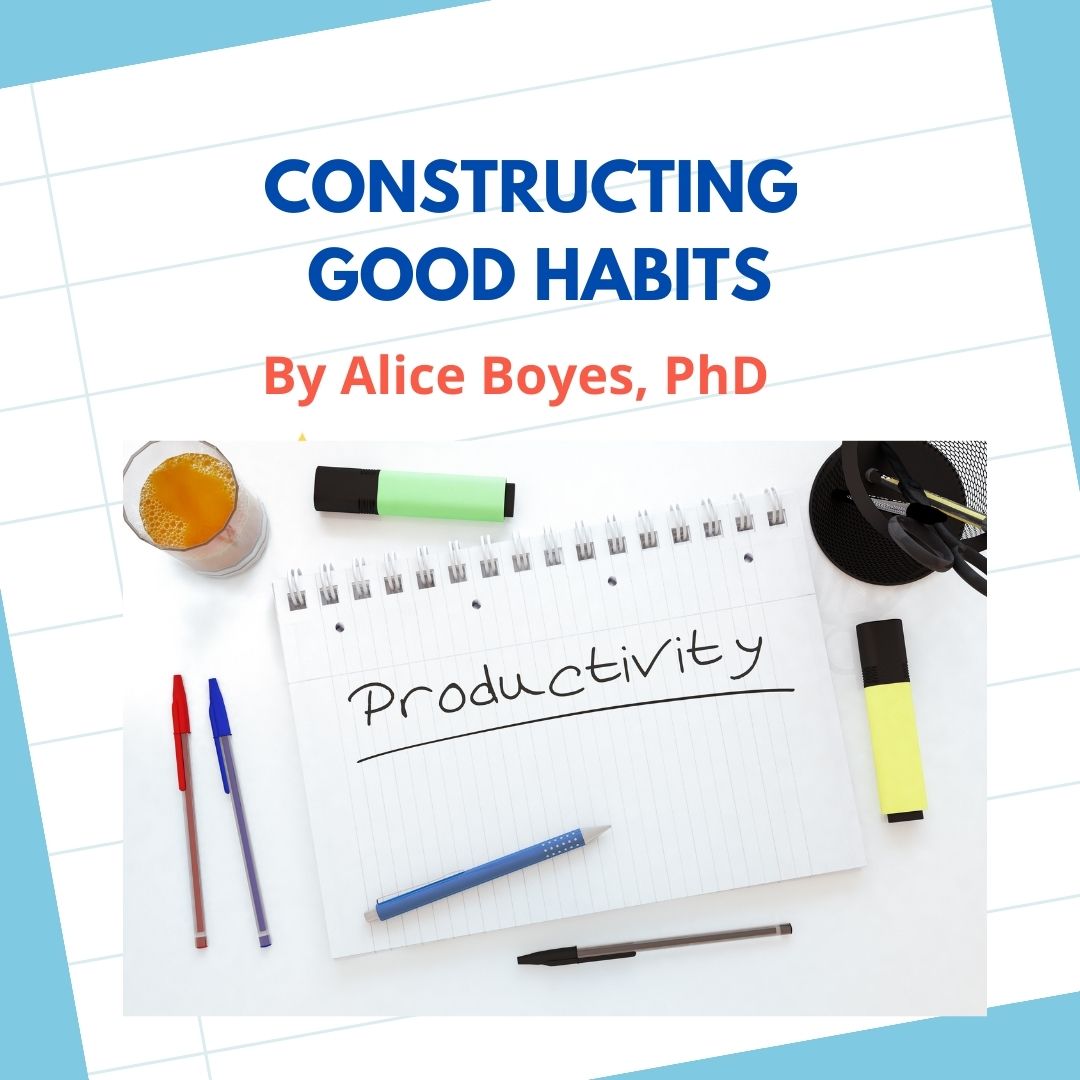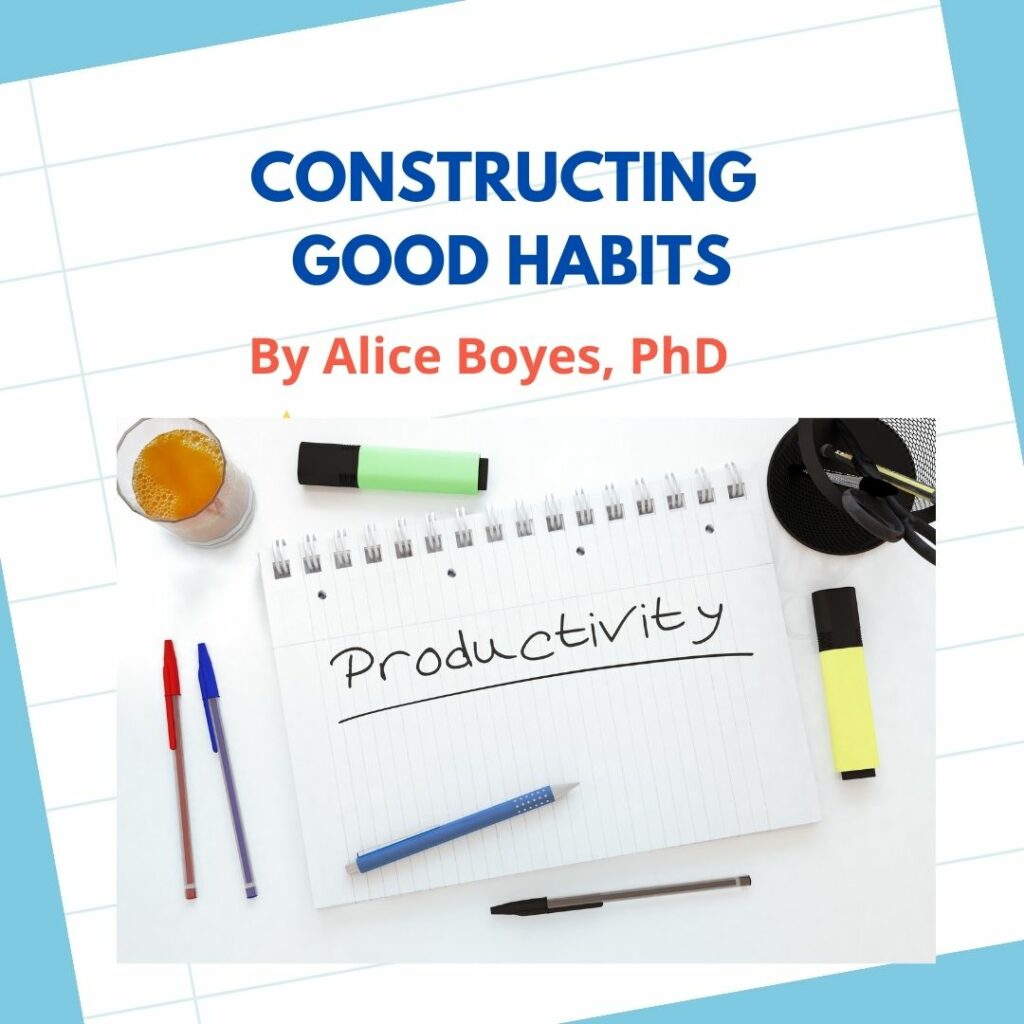
The beginning of a new year is a time for many of us to start mapping out our short and long term personal and professional goals.
What do you want to achieve this year? It might be gaining new customers, aiming for and achieving a new role or maybe working towards more work-life balance.
So how are you going to get there?
This short article shares some weekly planning tips from entrepreneurs.
A recent study suggests that by using paper, rather than a digital tool makes your planning more effective. Paper users “developed higher quality plans and fulfilled them at a higher success rate than their counterparts who used mobile phones.”
But should you make a plan or set goals? This article looks at the difference between plans, goals and resolutions and the pros and cons of each.
Current thinking is focusing on changing behaviour patterns and developing new (and breaking old) habits.

In his book Atomic Habits, author James Clear explains why bad habits are so difficult to break.
(Clear’s book is in high demand from the Wellington City Libraries collection but it is available in a number of formats).
A recent NZ Listener article Up and Atom is based on Clear’s work and includes input from Sir John Kirwan. The advice is that to achieve big results you must first make little changes to your work/life patterns and embed these in your day to day thinking.
Whatever route you chose we have resources to help you set those goals, develop your planning and adopt some new habits to get you on your way.Atomic habits : tiny changes, remarkable results : an easy & proven way to build good habits & break bad ones / Clear, James
“Atomic habit, noun. Definition: A small habit with big results. People say when you want to change your life, you need to think big: swap job, move house, change partner. But they’re wrong. World-renowned life coach James Clear has discovered a completely different way to revolutionise your behaviour. He knows that lasting change comes from hundreds of tiny decisions – doing two push-ups a day, waking up five minutes early, or holding a single short phone call. He calls these atomic habits. Clear delves deep into cutting-edge psychology to explain why your brain is able to amplify such small changes into such big outcomes. He uncovers a handful of simple life hacks (the forgotten art of Habit Stacking, or the unexpected power of the Two-Minute Rule), to show how you too can grow tiny shifts into life-transforming changes in behaviour. And he reveals a simple four-stage method that will let you build atomic habits into your day-to-day life, starting now. These nuclear changes will have an explosive effect on your career, your relationships and your life.”–Publisher.” (Catalogue) Also available in Hindi and on EBook Borrowbox , EBook Overdrive , EAudiobook Overdrive
Gearing up : leading your Kiwi business into the future / Kolb, Darl
“Published a decade ago and reprinted multiple times, the authors’ Changing Gears: How to Take Your Kiwi Business from the Kitchen Table to the Board Room was the first book that enabled Kiwi-sized firms to integrate business-school wisdom into their thinking. Gearing Up: Leading Your Kiwi Business into the Future is a completely revised and updated primer for owner-manager New Zealand businesses. The book introduces the business basics that haven’t changed (business models and financial drivers, leadership, team building, strategy and planning), while exploring how globalisation and digital transformations are challenging what we know about doing business. Throughout, the authors focus – through real examples – on the opportunities and challenges faced by the Kiwi men and women running our owner-operated businesses.” (Catalogue)
Planning to win : a guide to business planning & financial modelling / Pender, Gordon
“There are many books on business planning, and many more on management and entrepreneurship. They tell you what their authors think should be included in a plan. Planning to Win is different: it explains exactly how to prepare a business plan it illustrates the elements of a good plan and how they fit together to produce a professional and compelling document. It also includes practical examples: stories from the authors clients that show what happens in the real world. You may need to raise equity capital and/or a bank loan. You may be planning a new venture (if you are very brave). You may want to win a competitive government grant (if you are very patient). You may be planning a joint venture or a new export business. Perhaps you need to show your parents you can take over the family empire and succeed. Or you may want to write the best business plan in your management course or business planning competition. Whatever your situation, one thing is certain: you will understand your business much better if you plan it well. Ultimately, your prosperity is at stake. You are risking your valuable time, your job, perhaps your whole business. Professional business planning will help safeguard your own interests first. If you want to prepare the best business plan and succeed, Planning to Win is for you.” (Catalogue)
Rethinking strategy : how to anticipate the future, slow down change and improve decision making / Tighe, Steve
“Business leaders are desperate for help to position their companies for future success in a climate where business has never been more competitive, volatile or uncertain. Corporate techniques for navigating this complexity have not adjusted to this new dynamic and organisations have suffered an upsurge in strategic surprises proving disruptive to previously successful business models. This book provides an innovative end-to-end process designed to reframe strategy as a resource, and strategic development as the organisation’s principal creative and learning activity, while recognising that strategic creativity is fundamental to successful business transformation.” (Catalogue)
Burn the business plan : what great entrepreneurs really do / Schramm, Carl J
“Carl Schramm, the man described by The Economist as ‘the evangelist of Entrepreneurship’, has written a myth-busting guide packed with tools and techniques to help you get your big idea off the ground. Carl believes that entrepreneurship has been completely misrepresented by the media, business books, University programmes and MBA courses. He believes that the perception of what it takes to start a business no longer matches the reality – which is bad news for everyone because it stops great ideas coming to life. Burn the Business Plan punctures the myth of the cool, tech-savvy 20-something entrepreneur with nothing to lose and venture capital to burn, showing that most people who start businesses are juggling careers and mortgages just like you. Burn the Business Plan is written to encourage you to get started. It demystifies the entrepreneurial process portrayed on television shows like Dragon’s Den. It doesn’t rely on largely irrelevant stories of overvalued tech startups, nor does it build on the largely mistaken narrative of a linear path from cold start to great success that is the essence of business planning, as taught in universities. This is the guide to starting and running a business that will actually work for the rest of us. Burn the Business Plan is for regular people who just want practical, real-world advice on how to start and run a successful business. It shows you how to avoid the common mistakes and what you need to do to put your enterprise on track for success.”– Provided by publisher.” (Catalogue)
Do it for a day : how to make or break any habit in 30 days / Batterson, Mark
“The New York Times bestselling author of Win the Day challenges you to adopt seven powerful habits for thirty days and start your journey toward reaching your God-sized dreams”– Provided by publisher.Destiny is daily habits: our lives our built on our patterns of behavior, both constructive and counterproductive. Batterson believe you are only one habit away from a totally different life! Here he helps you identify changes that are “3M”: measurable, meaningful, and maintainable, and coaches readers step-by-step to change their lives. — adapted from back cover” (Catalogue)
The power of habit : why we do what we do and how to change / Duhigg, Charles
“Charles Duhigg takes us to the edge of scientific discoveries that explain why habits exist and how they can be changed. With penetrating intelligence and an ability to distill vast amounts of information into engrossing narratives, he brings to life a whole new understanding of human nature and its potential for transformation.” (Catalogue)
Good habits, bad habits : the science of making positive changes that stick / Wood, Wendy
“Wood draws on three decades of original research to explain the fascinating science of how we form habits, and offers the key to unlocking our habitual mind in order to make the changes we seek.” (Catalogue) Also available on EBook Overdrive and EAudiobook Borrowbox
If you need more information please contact the Prosearch team at the library. We can help you find information across a range of perspectives and resources. All enquiries are treated in confidence.




